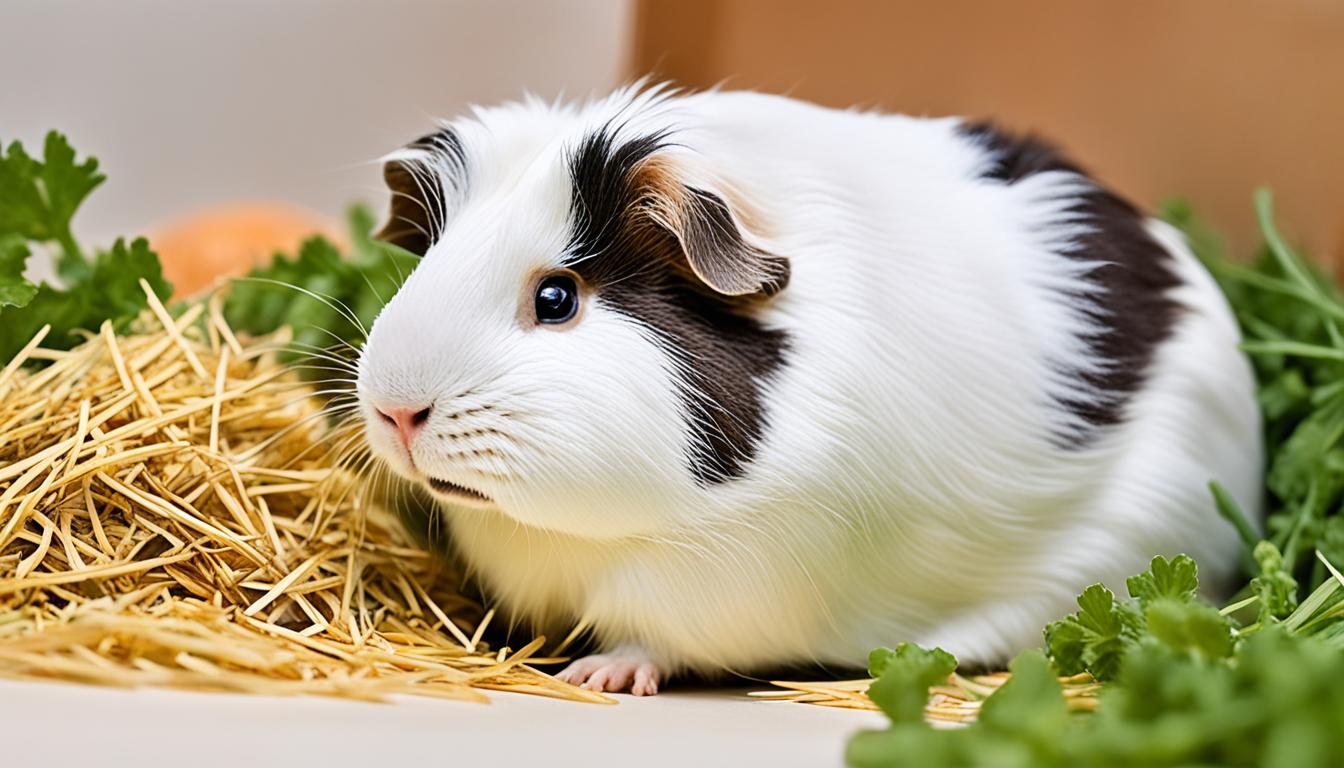Regular health checks are crucial for spotting common guinea pig illnesses early and preventing serious issues. Keep an eye on their behavior, eating habits, coat, teeth, and nails, and clean their cage regularly. Watch for signs like lethargy, loss of appetite, or abnormal droppings. Providing a balanced diet, a clean environment, and early vet visits help maintain their health. If you want to discover how to best safeguard your guinea pig, keep exploring these essential tips.
Key Takeaways
- Regularly monitor for signs like lethargy, loss of appetite, or abnormal droppings to catch illnesses early.
- Maintain a clean, spacious cage with proper bedding to prevent infections and foot injuries.
- Provide a balanced diet rich in vitamin C, fresh vegetables, and hay to strengthen immunity and prevent deficiencies.
- Check teeth and nails frequently for overgrowth, which can cause pain and indicate health issues.
- Seek veterinary advice promptly if you notice symptoms such as difficulty eating, changes in coat, or abnormal behavior.

Regular health checks are essential to keep your guinea pig happy and thriving. When you pay close attention to their well-being, you can catch potential issues early and prevent more serious problems down the line. One of the most important aspects of maintaining your guinea pig’s health is ensuring they have the right diet tips and housing essentials. Providing a balanced diet rich in vitamin C, fresh vegetables, and quality hay keeps their immune system strong and reduces the risk of common illnesses. Avoid feeding them processed foods or too many sugary treats, as these can cause digestive problems and other health concerns. Instead, focus on offering a variety of fresh greens, bell peppers, and occasional fruits, all in moderation. Proper diet is the foundation of good health, helping to prevent issues like malocclusion, obesity, and vitamin deficiencies. Additionally, heartfelt care and regular monitoring can significantly improve their well-being and longevity. Good preventative care routines, including routine checkups, can further detect early signs of illness before they become serious. Housing essentials also play a crucial role in your guinea pig’s health. Their living environment should be clean, spacious, and safe, which helps prevent injuries and reduces the risk of respiratory infections. A well-ventilated cage with solid flooring is preferable to wire-bottomed enclosures, as it prevents sore hocks and foot injuries. Make sure to clean the cage regularly, removing soiled bedding and leftover food, and replace it with fresh bedding to minimize bacteria buildup. Providing appropriate bedding further enhances comfort and hygiene. Adequate housing also means providing hiding spots and chew toys to reduce stress and encourage natural behaviors, which are essential for their mental health. When your guinea pig feels secure and comfortable, their overall health improves, and they’re less likely to develop illnesses caused by stress or poor hygiene. Regular health checks should include observing your guinea pig’s behavior, eating habits, and physical appearance. Look for signs of illness such as lethargy, loss of appetite, unusual droppings, or changes in coat condition. Check their teeth and nails regularly, as overgrown teeth can cause pain and eating difficulties. If you notice any abnormal signs, consult a veterinarian experienced with small animals promptly. Preventative care, including routine checkups and maintaining proper diet tips and housing essentials, markedly reduces the chances of your guinea pig developing serious health issues. Remember, your attentive care not only keeps your pet physically healthy but also fosters a trusting bond, making their life happier and more comfortable. With consistent monitoring and proper environment management, you can enjoy many happy years together, ensuring your guinea pig remains lively and healthy.
Frequently Asked Questions
How Often Should I Schedule a Vet Visit for My Guinea Pig?
You should schedule a vet visit for your guinea pig at least once a year for a routine health check. Regular guinea pig grooming and cage maintenance are essential, but annual vet visits help catch any hidden health issues early. Keep an eye on their behavior and appetite. If you notice any changes or signs of illness, don’t wait—bring them to the vet sooner. Consistent care keeps your guinea pig happy and healthy.
What Are Early Signs of Dental Problems in Guinea Pigs?
You should watch for early signs of dental problems like tooth pain or overgrown teeth in your guinea pig. If you notice drooling, difficulty eating, or a decrease in appetite, these could indicate discomfort. Also, look for weight loss or a change in chewing habits. Regularly check their teeth and gums, and schedule vet visits if you see any of these signs, to prevent more serious issues.
Can Diet Changes Prevent Common Guinea Pig Illnesses?
You might wonder if diet changes can prevent common guinea pig illnesses. Research shows that nutrition optimization plays a vital role in their health. A balanced diet rich in vitamin C and fiber reduces illness risks, while dietary supplements can fill nutritional gaps. By providing high-quality hay, fresh veggies, and appropriate supplements, you actively support your guinea pig’s immune system, helping prevent issues like dental disease and obesity.
How Do I Recognize if My Guinea Pig Is in Pain?
You’ll notice your guinea pig is in pain through behavior signals and pain indicators. It may become less active, hide more, or show signs of discomfort like squeaking or teeth grinding. Watch for changes in eating or grooming habits. If your guinea pig shows these pain signals, it’s important to detect a vet promptly. Recognizing these signs early helps guarantee your pet gets the care it needs.
Are There Specific Toys or Bedding That Promote Health?
Think of your guinea pig’s environment as a garden that needs nurturing. You should choose safe bedding like paper-based or fleece options that prevent irritation. Stimulating toys, such as tunnels or chew toys, keep your pet engaged and prevent boredom. These essentials promote health by encouraging activity and reducing stress. Regularly clean the bedding and rotate toys to maintain a clean, enriching space that supports your guinea pig’s well-being.
Conclusion
Just like a vigilant gardener tending to their roses, keeping a close eye on your guinea pig’s health guarantees it blooms brightly. Regular checks and prompt care can prevent small issues from growing into big problems—think of it as catching the first signs of a storm before it hits. By staying attentive, you’re not just caring for your pet; you’re nurturing a happy, healthy companion ready to bring joy, much like a well-tended garden in full bloom.










